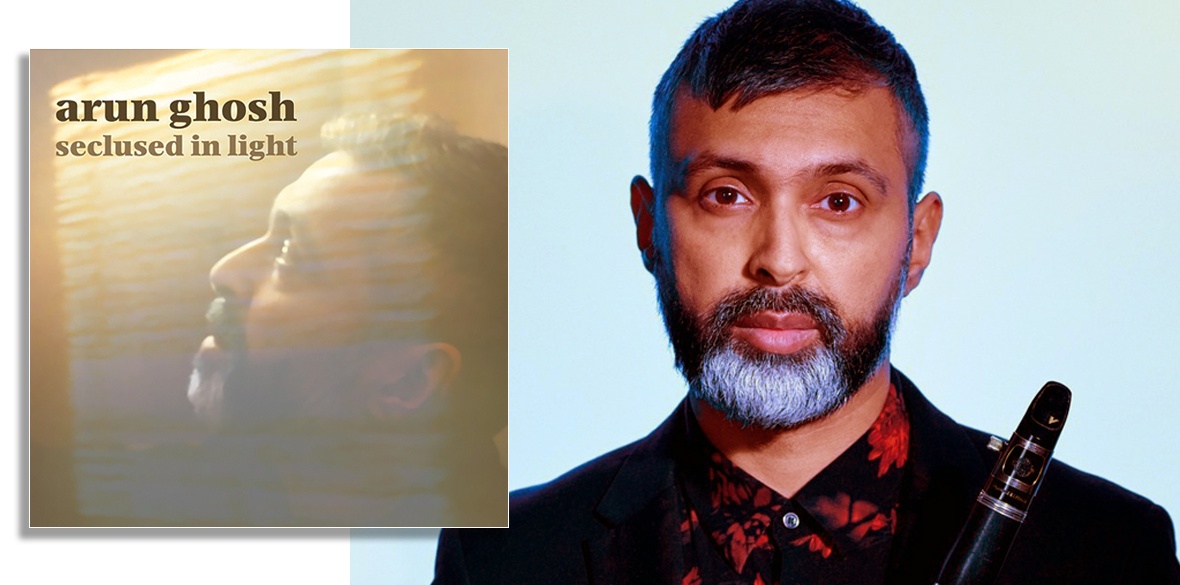This is the last article you can read this month
You can read more article this month
You can read more articles this month
Sorry your limit is up for this month
Reset on:
Please help support the Morning Star by subscribing here
HEARING the Bolton-bred clarinettist Arun Ghosh and his quintet, live again at the Vortex in Dalston, with the communal sounds directly outside the venue of Gillett Square’s talkers, declaimers, drinkers, skateboarders, eaters and dominoes virtuosi accompanying every note they created, was a wonderfully restorative musical post-pandemic experience.
They were playing tunes from their new album Seclused in Light. The beautiful melodism of Surrender to the Sea and Sister Green and the rampaging Sidney Bechet-like verve and rhythmic upsurge of cityscape sounds like Fiveways and Hanji!, fused in a surge of now-times sonic vision which made the heart and brain of Dalston shudder with joy.
Ghosh explained that the word “seclused” is his neologism, combining two realities of feeling secluded and reclusive, made more intense by the pandemic, yet finding comfort being alone in the studio with clarinet, keyboard, guitar, bass and percussion.
When I suggested that he was an ardent melodist, he replied: “To me, music has always been about melody. As a boy I played recorder and loved TV melodies like Coronation Street and Only Fools and Horses. My Dad came from West Bengal and my Mum from Sindh, so later the melodies of Indian classical and folk music inspired me. Everything I want to say comes from within melody.”
As I told him how much the sheer attack of his clarinet playing reminded me of my own boyhood musical hero, the great Sidney Bechet of New Orleans, he said Bechet had been one of his prime inspirations too, and the album’s final track, Farewell Blue, dedicated to his Dad whose name was Nil (Blue in Bengali), grew from his love of Bechet’s Blue Horizon. “Bechet was a great player,” said Ghosh, “a pioneer of world music before its time.”
Who were his other inspirations? “Coltrane, big time — the energy and fluidity of his playing. And Cannonball Adderley, Bela Kuti of Nigeria, Paul Desmond, the Ethiopian saxophonist Getatchew Mekurya, the Indian shehnai virtuoso who inspired Coltrane —Bismillah Khan, and Courtney Pine. He was the first saxophonist I ever heard live, playing soprano sax when I was 11 at a Free Nelson Mandela concert. Then my mum bought me his album, Destiny’s Song.”
I asked him how the pandemic had affected his music. “I was responding to and dealing with grief,” he said. “My dad passed away at the start of the pandemic and I found myself deeply reflective about metaphysical issues of life and death. I felt very alone and I needed to push myself to release the music inside me. I wanted to tell listeners my stories, as if stories too are very much a part of improvisation.
“But my music tells the stories of people’s struggles as in my early albums — whether in Longsight in Manchester like my Longsight Lagoon, or in Palestine, as expressed in my tune Intifada.”
He told me how much he loved playing in venues close to working class communities, like the Vortex. “It’s a very special place, its doors are always open to us. We feel the direct communication with people in the streets outside. I’ve always been a busker — I used to play Christmas carols in the centre of Bolton. Our music is totally communal and open, we try to welcome all people into it.
“Our music could only have come from England, as it is now. It’s where English folk music meets Bengali rhythms and melodies. It’s irreverent, punk-inspired too, and definitely Mancunian! Yet in my melodies I also try to evoke nature and the English countryside as in Sister Green, its mystical qualities, its ancient pathways — the hills around Bolton, the Lake District.”
His quintet at the Vortex, with Chris Williams on alto sax, drummer Rastko Rasic, guitarist Moss Freed and bass guitarist Huw Marc Bennett playing with the band for the first time, were full of life, fire and skilled musicianship.
“We’re there to support each other, it’s totally communal music,” asserted Ghosh. And he’s right: listening to the mutual joy and belongingness within the music, is deeply moving and humanising.
That’s the message of Ghosh and his bandmates. The intense optimism and positivism of their music radiates into all who listen. Don’t miss them next time they’re down your way.












